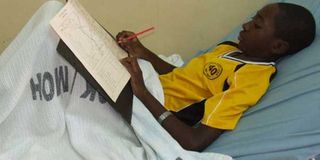Special exams to start next year

A KCPE candidate writing his exam in hospital where he is admitted after undergoing surgery. Knec is set to introduce special exams for candidates who fall sick or suffer other calamities such as death in the family during national examinations. FILE PHOTO | NATION MEDIA GROUP
What you need to know:
- Universities also give supplementary exams to students who fail the main one, though with penalties in grading.
- Candidates writing KCPE from hospital include teenage girls who have given birth.
The presidential directive to have special tests for candidates who fall sick or suffer other calamities such as death in the family during national examinations will be implemented next year.
Kenya National Examinations Council chairman George Magoha said the council was studying the proposal by the President and will work out modalities of executing it.
“Since we are coming to the end of this year’s examinations cycle and the candidates have done the papers, we can’t act retroactively; so, we will organise ourselves to roll out the proposal next year,” said Prof Magoha.
DISTRESS
The development will push Kenya to the ranks of countries that have humanised exams and respect the rights of learners in distress.
Prior to the release of Kenya Certificate of Primary Education (KCPE) examination results on Tuesday, President Uhuru Kenyatta met the Education Cabinet Secretary, Dr Fred Matiang’i, and Knec officers and directed them to consider resits to cushion candidates in difficult and traumatic conditions.
The decision was announced by State House Spokesperson Manoah Esipisu, who said the President was concerned that the current practice of only one exam disadvantaged candidates in distress.
Special exams are a traditional practice in universities, which give students afflicted by misfortunes a chance to be tested instead of waiting for a year or so to sit fresh tests.
Universities also give supplementary exams to students who fail the main one, though with penalties in grading.
Prof Magoha, a former Vice-Chancellor of the University of Nairobi, told the Nation the decision was timely, noting that it was unfair to have candidates sit exams while indisposed or mourning a close relative.
UNFAIR
“It is traumatic and unfair to candidates to do exams when they are hurting,” said Prof Magoha. “We welcome the new move but, realistically, we agreed that it should start next year because this year’s exams are now gone.”
Knec, he said, will work out the criteria for determining those eligible to sit the special exams and the objective would be to ensure only those in dire straits are given the tests.
It is noted that such provisions can be abused by loafers and malingerers who, when faced with the final exams, may feign adversity to take advantage of the offer. Among others, it will require certification from doctors to authenticate the intensity of illness of affected candidates.
“We do not expect to have many candidates sitting the tests if we go by the number of those who sit exams in special circumstances,” he said.
Candidates writing KCPE from hospital include teenage girls who have given birth.
The number cannot go beyond 300. This year, 43 candidates sat the exam in hospital, down from 50 in 2016. A trend analysis from 2013 shows they hardly exceed 50. There were 993,718 total candidates this year, up from 942,021 last year.
According to the don, Knec will henceforth prepare two sets of exams upfront — the main tests and the special ones. It will also consider elements such as weighting of the grades, security, marking and the period to write the tests, given that exam cycles must fit within a tight calendar.




